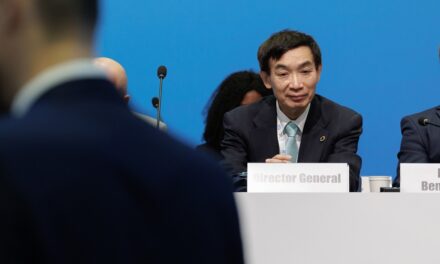
The Consultative Committee – Making an impact
The Consultative Committee (CC) of the Universal Postal Union (UPU) is becoming the “must-be-there” organization for any business that depends on a well-developed postal system. This is the place where mailers, suppliers, equipment developers, software specialists and anyone with an interest in international postal and delivery services can make their views known directly, unfiltered and undiluted by the extraneous concerns of regulators, ministries and governments. We are already making a substantial contribution to the UPU and we have only just begun.
Created on 16 September 2004 by the 23rd Universal Postal Congress in Bucharest, the Consultative Committee is the youngest body of the UPU. It gives postal stakeholders other than public postal operators and regulators a voice in the organization’s deliberations. The Consultative Committee’s rules state that it “is established to provide a stable framework for the participation of the wider international postal sector in the Universal Postal Union, including developing recommendations for UPU policy, regulation and operations, creating a better understanding between stakeholders and the member states of the Union, and providing a forum to consider wider sector issues.”
Membership is open to “non-governmental organizations or associations representing customers, consumers, delivery service providers, organizations of workers, suppliers of goods and services to the postal services sector, and like organizations of individuals and companies that have an interest in international postal and delivery services…”
Influencing the UPU is important. It is the body where postal systems and governments negotiate how much a sending post pays a receiving post to deliver its foreign mail or parcels, what can be carried between countries, what addresses should look like, the permissible weight of mail bags, security issues and many other things that relate to shipping mail internationally. Before the CC’s establishment, the UPU was open to non-governmental bodies by invitation only. But now mailers, competitors, customers, labor unions and anyone with a demonstrated interest in UPU issues can have a voice.
The UPU is also the place where work is being conducted on many exciting projects. These include the development of an international electronic postal money transfer system, an electronic post mark standard, an address standard that will revolutionize mail-handling, quality of control measuring systems, even an internet top-level-domain “dot.post”. Now you don’t need to be a government or postal system to be there and create the future.
In the 1980’s, posts and express carriers began expanding internationally and, with the privatization and liberalization of posts, competition in parcel and letter traffic internationally and domestically increased. This trend accelerated in the 1990’s with increasing foreign investment by these players. With this new competition, many companies began to identify competitive advantages enjoyed by postal systems that to them seemed unfair. The UPU Congress was the place to begin to complain.
At the UPU Congress in Beijing in 1999, an uproar occurred when a prominent express carrier association was denied even observer status in the plenary proceedings. On the agenda were several matters that directly or indirectly could impact its members’ businesses, and they felt it important to be there. The tight-knit postal world came together to eject them. This issue had been bubbling for years, and was not unexpected. In some quarters there was an awareness of a need to make the UPU more transparent. Thus, various diplomatic steps were taken by major governments to avoid what could have become a major, and embarrassing, case in the World Trade Organization (WTO). The ejection was in fact a scandal.
The Congress adopted a resolution to at least begin to look at the issue of providing greater transparency in the UPU’s work through increased stakeholder participation. The body formed was first called the High Level Group, which invited other stakeholders, including the express carriers, to observe the UPU meetings. After two years of tortured negotiation, complete with the occasional theatrical outburst by representatives of the express industry, this group established a body called the Advisory Group. Lengthy negotiations and discussions over the next few years resulted in the establishment of the Consultative Committee by the Bucharest Congress in 2004.
Our membership currently consists of 19 non-governmental associations and organizations representing customers, delivery service providers, workers’ organizations, suppliers of goods and services to the postal sector and other organizations that have an interest in international postal services, including direct marketers, private operators, international mailers and printers. In addition, three postal operators and three regulators/ministries join our 19 associations. A complete list is available at http://www.upu.int/consultative_committee/en/members.shtml.
Major issues and projects are discussed and initiated at bi-annual meetings held at the UPU in Bern in March and October in conjunction with meetings of the major UPU bodies, the Postal Operations Council (POC) and the Council of Administration (CA). This is also when working groups and task forces of the CA and POC meet to report on progress in their projects or to discuss and debate issues. These meetings are now open to the CC members, and their views are welcome.
Several of our members are active in these groups, both at these times and at working meetings around the year and throughout the world. For example, XLA (an express carrier association) reports regularly on trade and market access issues discussed in other UPU committees. PostCom US has members contributing to the work of the Standards Board (address standards) and two separate bodies engaged in strategic planning and long-term change for the UPU. IMAG and PostCom assisted the UPU group that is studying the future by consolidating our membership’s responses to their survey to provide a snapshot of the private sector’s vision of the future and what the UPU should focus on. We have been asked to assist with planning and programming the UPU Strategic Conference in Dubai this November and have provided written advice and attended meetings to give advice. As chair of the CC, I am invited to participate in the meetings of the Co-ordination Committee, which has an advisory/oversight function with respect to the CA and POC. Finally, the DMA has been invited to participate in the Electronic Products and Services Group work involving the electronic postmark and dot.post and is engaged in providing business input to these projects.
The CC itself is conducting a major study of direct access by postal systems and customers to other posts’ networks. As the postal monopoly is further opened to competition, this subject will become one of international interest. A further survey-based project regarding change of address systems is under consideration. This project will determine what systems exist, whether they can be interoperable, show posts how critical they are to mailers and addressees and how the systems can save the posts money and reduce paper waste.
Between these two semi-annual meetings, work is pushed forward by a Management Committee which holds monthly meetings, generally by telephone in order to maximize participation and minimize expense. We will also soon deploy some exciting web-based tools to advance our work. We welcome observers to join us at our plenaries and at our Management Committee meetings.
My personal goals as Chairman of the CC are to broaden industry participation in our work, increase awareness in the wider business community of the importance of the UPU to development of all our economies, increase the use of direct mail as a marketing tool worldwide and be our sector’s voice in the debates on reformation of the UPU and Posts around the world. The issues are too important to be left to the Posts, their regulators, or their government owners. To that end, I travel regularly to attend meetings of regional postal unions and I welcome invitations to speak at company and association events where there is interest.
Both I and the International Bureau of the UPU would be delighted to answer any questions you might have about our work or that of the UPU. I can be contacted at [email protected], and our main support at the UPU is provided by Ken McKeown, [email protected]. To read more about the UPU and its bodies, see my article The Universal Postal Union: A Primer for Business on How it Works and Why it Matters, available at http://www.upu.int/news_centre/en/papers_upu.shtml or by sending me an e-mail.












